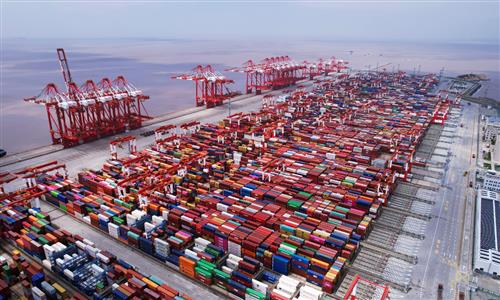
The skyline of Lujiazui in Shanghai Photo: CFP
China should accelerate the improvement of the structure of its foreign assets so as to increase yields on its net foreign assets and ensure the security of its foreign assets, especially foreign exchange reserves, Yu Yongding, an Academician of the Chinese Academy of Social Sciences, said at the Sanya International Forum held by Caijing Magazine in Sanya, South China's Hainan Province on Sunday.
In order to achieve the goal, we should implement the "dual circulation" strategy of development by taking the domestic market as the mainstay, Yu said, noting that an expansionary fiscal policy will give a boost to the country's economic growth and an increase in imports.
China holds a variety of foreign assets, the bulk of which is reserves and other low-yield assets, although its outbound direct investment (ODI) has increased significantly in recent years.
As of the end of November, the country's foreign exchange reserves stood at $3.1718 trillion, up from $3.1012 trillion at the end of October, due to the combined impact of currency translation and asset price changes, data from the State Administration of Foreign Exchange showed.
"Sufficient foreign exchange reserves are important for a country as they offer liquidity for a country's international economic activities such as ODI, and serve as a buffer against external shocks during times of crisis and a deterrent against potential speculative attacks on the domestic currency," Yu told the Global Times after the forum.
However, it does not mean that the more foreign exchange reserves the better. The size of foreign exchange reserves that a country holds should be large enough to cover its imports, short-term external debt and other factors.
Assessed by all traditional measures, China's foreign exchange reserves far outpace internationally recognized reserve adequacy levels, Yu said.
"It is necessary for China to continue to reduce holdings of US Treasury debt in an orderly fashion," Yu said.
The net external debt of the US has reached $18 trillion, amounting to more than 60 percent of its GDP. Were it a developing country, the US would have already gone bankrupt.
The trajectory of a country's net foreign debt is determined by four factors: private investment and the private savings gap, the budget deficit to GDP ratio, investment income and the growth rate of GDP.
Given the trends of these variables, a back-of-the-envelope calculation can show that America's net foreign debt will continue to grow to reach an unsustainable level in the coming years. As a result, sooner or later, America's old issue of "external sustainability" will return, Yu said.
He said China will not dump US Treasury debt because of current low prices, but it's also unlikely to roll over debt as it expires.
According to the US Department of the Treasury, foreign holdings of US Treasury debt in September fell to their lowest level since June. Total holdings of US Treasury debt stood at $7.605 trillion in September, down from $7.707 trillion reported in the previous month.
China's holdings fell further to $778.1 billion, the lowest since 2009, according to media reports.
Xi Junyang, a professor at the Shanghai University of Finance and Economics, told the Global Times on Sunday that the decline partly reflected lower Treasury prices due to a rise in long-term US interest rates after several hikes.
Meanwhile, China increased gold holdings for the 13th straight month in November, pushing its gold reserves to 71.58 million ounces, up 380,000 ounces from the previous month, according to the People's Bank of China, the central bank.
As a global trend toward de-dollarization has already begun, many countries have accelerated diversifying their reserves by increasing gold holdings and using local currencies for payment, Xi said.
"On the one hand, US economic and fiscal policies - for example, interest rate hikes - have spillover effects, especially on emerging economies. On the other hand, US moves to weaponize the dollar have seriously hurt the credibility of the currency," Xi said.

